Last May, Libya launched its E-Residency Permit System through the Wafid Platform, a digital portal simplifying the residency application process for foreign nationals. Aiming to improve administrative efficiency and transparency, it aligns Libya with international standards in digital governance.
By offering a fully-online residency process, it has never been easier to become a resident in Libya. The system seeks to attract skilled professionals, businessmen and investors, reflecting Libya’s efforts to digitalise its administrative frameworks and integrate into the global economy.
This guide will help you use the system and capitalise on it to become a Libyan resident in little to no time.
Table of Contents
Overview of the E-Residency Permit System
The E-Residency Permit System allows foreign nationals to apply for various types of residency permits online. The platform supports multiple categories of residency permits, catering to business professionals, skilled workers, and expatriates. By minimising processing times and eliminating the need for physical visits, the system ensures a more efficient and secure application process.
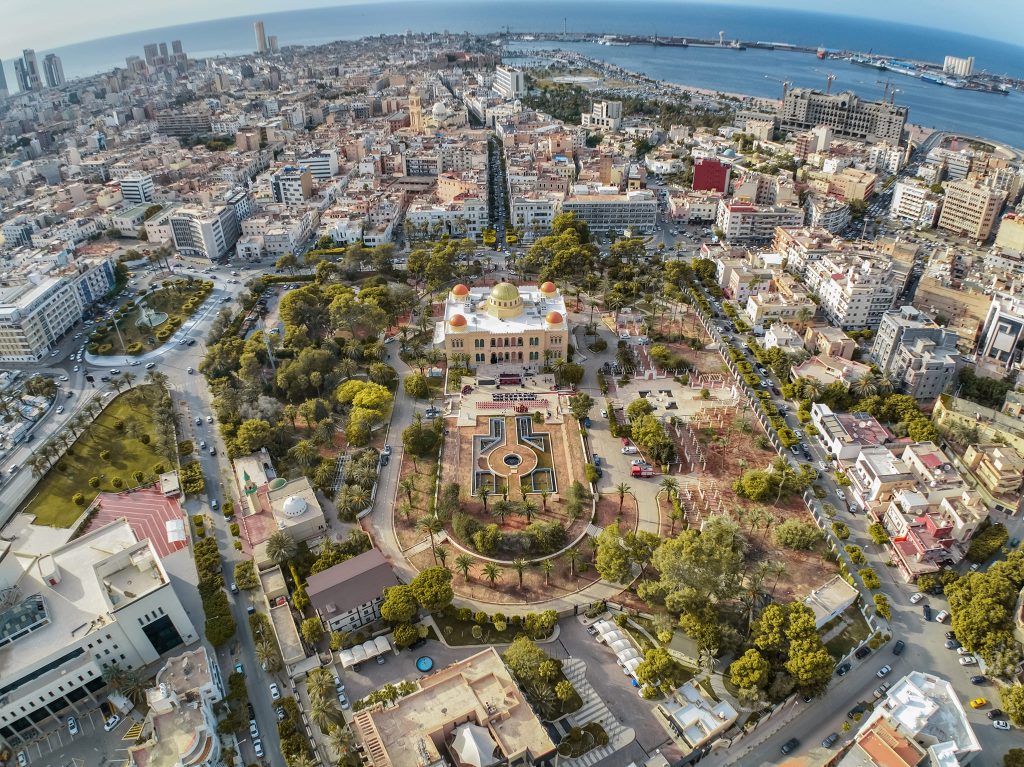
Key Features of Libya E-Residency Platform
- Company Registration: Companies can register to sponsor foreign workers. This includes providing detailed information about the company and its activities.
- Worker Registration: Expatriate workers can register themselves and complete their residency procedures online. This involves providing personal information and uploading required documents.
- Digital Processing: The platform automates and digitises the application process, ensuring accurate and efficient handling of applications.
Step-by-Step Guide to the eResidency Application
1. Access the eResidency Website (Wafid Platform)
To initiate the application process, applicants must visit the official Wafid Platform. Designed with a user-friendly interface, the platform will soon offer multiple languages, catering to a diverse group of users. It guides applicants through the initial steps of creating an account and provides access to all necessary forms and information, ensuring a smooth start to the application process.
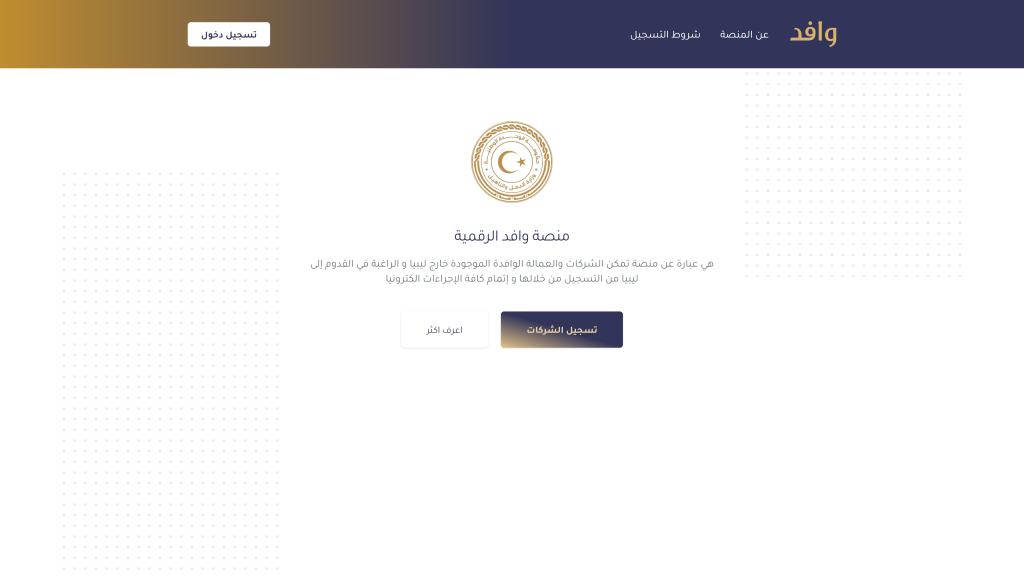
2. Account Creation
Creating an account on the Wafid Platform involves entering personal details such as name, nationality, and contact information. Applicants must verify their email address and phone number to activate their accounts. This verification step is crucial for maintaining the security and integrity of the application process. Ensuring accurate information at this stage helps prevent delays and complications later in the process.
3. Filling the Application
The application form on the Wafid Platform requires detailed information about the applicant’s background, including personal identification details, travel plans, and the purpose of the stay in Libya. Applicants must select the appropriate category of residency permit that best fits their purpose, whether for business, employment, or other reasons. Providing thorough and accurate information is essential to avoid delays during the review process.
4. Document Upload
Applicants must upload high-quality digital copies of essential documents. Required documents typically include a valid passport, recent passport-sized photographs, an employment contract (if applicable), proof of financial stability, and health insurance coverage. Each document must meet specific format and quality standards as specified on the platform. Proper documentation ensures the application is processed efficiently and without unnecessary delays.

5. Paying the Residency Fee
The Wafid Platform features a secure payment system that supports various payment methods, including credit and debit cards, and bank transfers. Applicants must pay the residency fee to complete their application. Upon successful payment, a receipt is generated, which should be saved for future reference. This receipt serves as proof of payment and is an important document in the application process.
6. Application Submission and Review
After submitting the application, the Libyan authorities will review it. Applicants receive a unique tracking number to monitor the status of their application through the Wafid Platform. The review process involves verifying the provided information and documents. If additional information or corrections are required, applicants will be notified through the platform. Prompt response to these notifications is essential to ensure timely processing.
7. Approval and Issuance
Once the application is approved, the applicant receives a notification via the Wafid Platform. The e-Residency permit is issued electronically. Applicants must print a copy of the permit for presentation upon arrival in Libya. It is important to have all required documentation ready for inspection at the border to ensure a smooth entry process.

And just like that, you are ready to become a resident in Libya.
From the streets of ancient Carthage to those of Leptis Magna, Libya has always been a crossroads of civilisations. Today, through the modern eResidency Website (Wafid Platform), it has never been easier join this storied continuum, becoming part of a country rich in history and potential.
Welcome to Libya!
Libya Residency Permit: FAQs About the Libya eResidency Platform
What is the Libya eResidency Permit System?
The Libya E-Residency Permit System, launched by the Ministry of Labour and Rehabilitation, is a digital tool designed to manage the registration and administration of foreign workers in Libya. It allows companies and expatriate workers to complete all necessary procedures electronically, enhancing efficiency and reducing administrative burdens.
How Do Companies Register for a Libya E-Residency Permit?
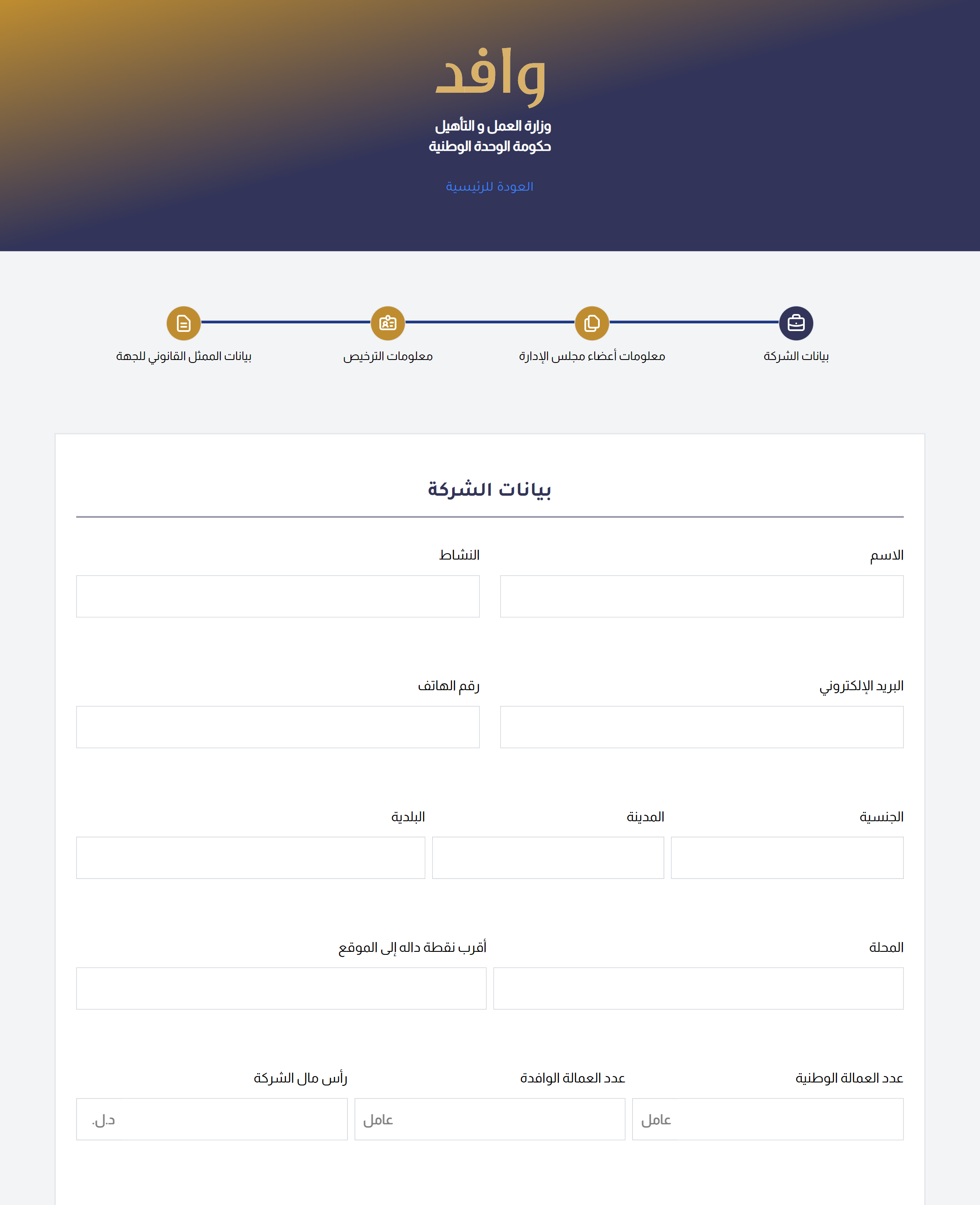
To register for a Libya E-Residency Permit, companies must first obtain a unified registration number as per the Minister of Economy and Trade’s decision (Decision No. 61 of 2021). This registration number can be acquired by visiting the official site at cr.eidc.gov.ly. Once the registration number is secured, companies can proceed to register for the E-Residency Permit by providing detailed information about their business and verifying their commercial license.
What Documents Do Companies Need to Register for a Libyan eResidency Permit?
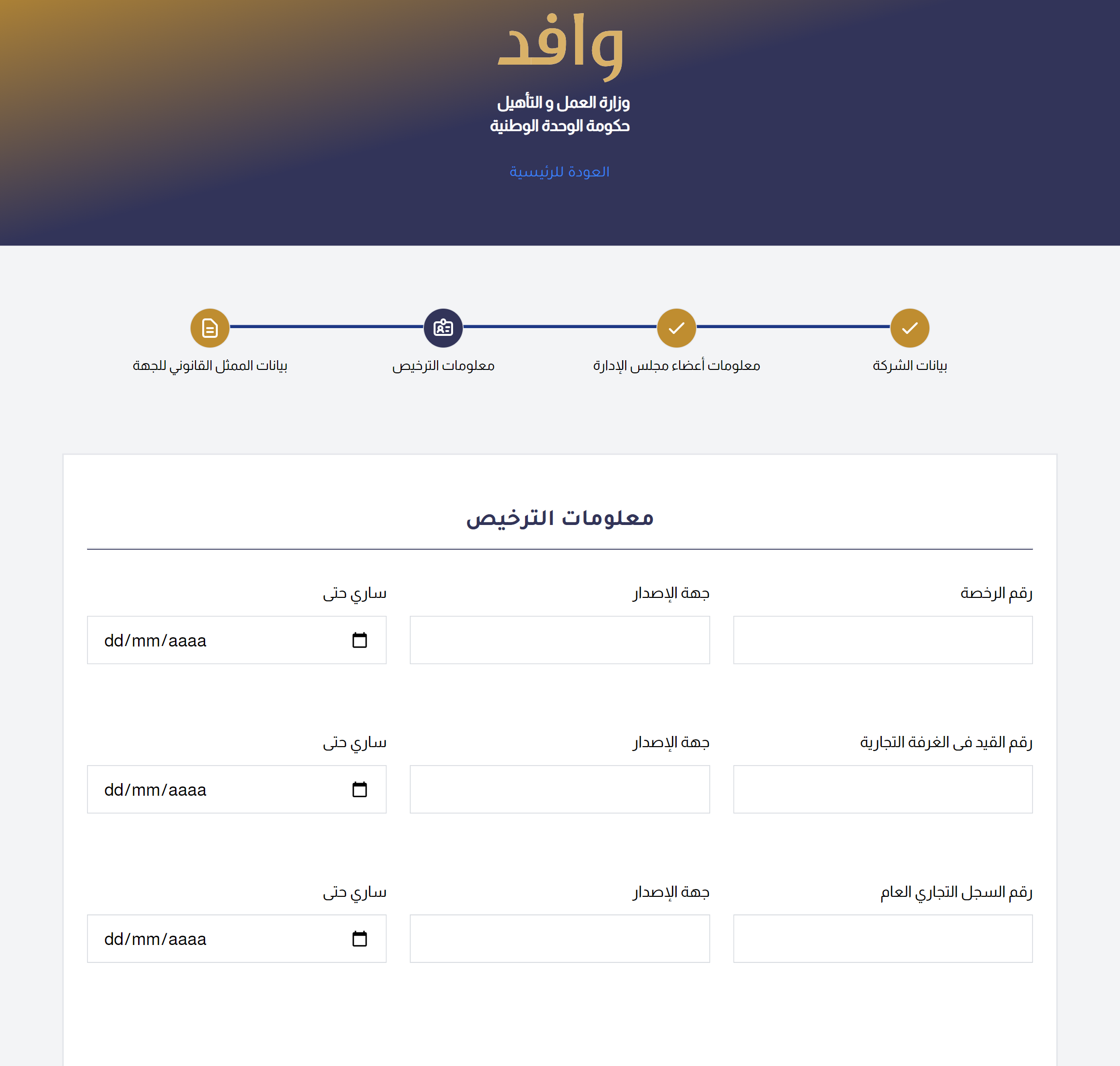
Companies need a valid and up-to-date commercial license before registering for a Libyan E-Residency Permit. This ensures that the company is legally recognised and authorised to operate in Libya. Additionally, the company must have a unified registration number, confirming its registration with the Ministry of Economy and Trade.
Who Submits Applications for Libyan eResidency Permits?
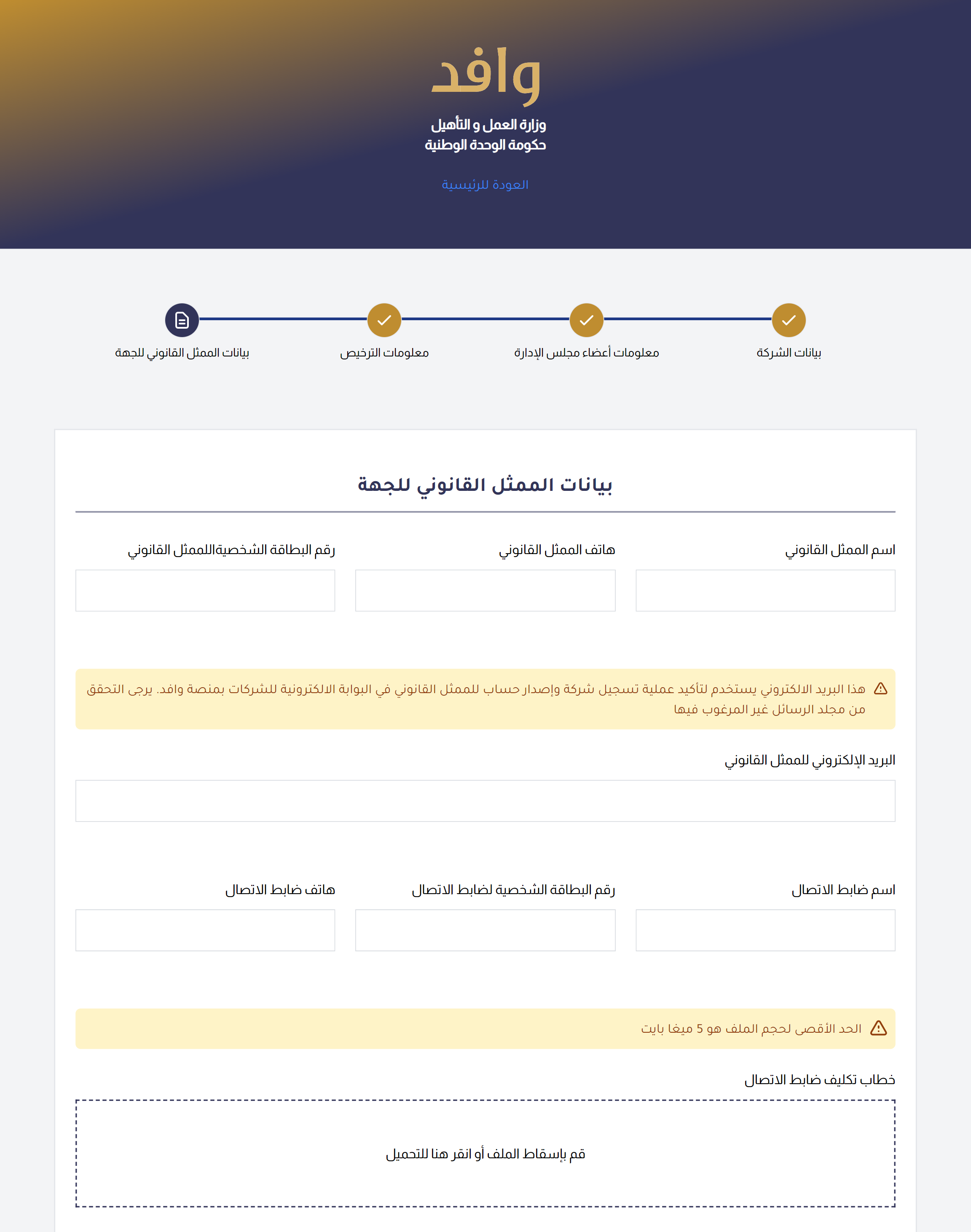
Applications for Libyan E-Residency Permits must be submitted by a designated employee of the company. This employee is responsible for ensuring all required information and documents are accurately provided and uploaded to the platform. The designated employee acts as the primary point of contact between the company and the authorities, facilitating communication and managing the application process.
How Do Companies Ensure Job Roles for Foreign Workers Align with Libyan Regulations?
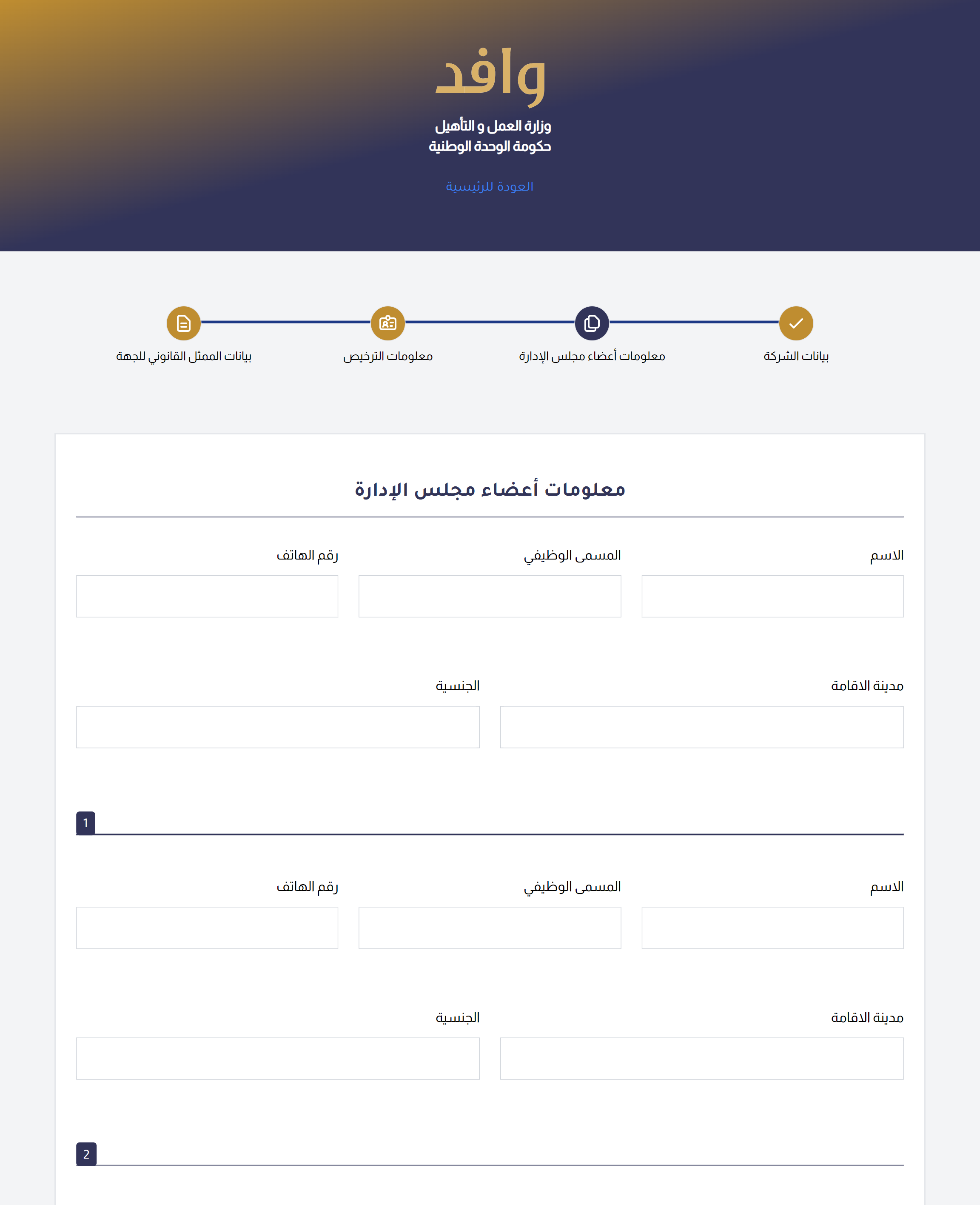
Companies must verify that the job roles for foreign workers align with the company’s registered activities as stated in their commercial license. This involves reviewing job descriptions and ensuring they match the company’s authorised business activities. Proper alignment is crucial for compliance with Libyan regulations and to prevent any legal or administrative issues during the residency permit process.
What Are the Insurance Requirements for Foreign Workers in Libya?
Each foreign worker applying for a Libyan E-Residency Permit must have a valid insurance policy. The approved insurance provider is Al-Ittihad Insurance Company. Companies and workers can obtain more information and secure the necessary insurance policies by visiting aic-mang.com. Having a valid insurance policy is essential to meet the health and safety standards required for residency permits.
What Health Certificate Requirements Exist for Foreign Workers in Libya?
Foreign workers must obtain a valid health certificate from an accredited medical facility in their country of residence. This certificate ensures the worker is medically fit to work in Libya. For Egyptian workers, health certificates must be issued through the Taafey platform, accessible at taafey.com. Ensuring the health certificate is valid and issued by an accredited source is critical for the approval of the residency application.
How Do Foreign Workers Obtain a Health Certificate for a Libyan eResidency Permit?
Foreign workers need to visit an accredited medical facility in their home country to obtain a health certificate. This certificate must confirm their medical fitness and should be in the format required by the E-Residency Permit system. Egyptian workers must obtain their health certificates through the Taafey platform. Ensuring the health certificate meets all requirements is essential for a smooth application process.
How Do Foreign Workers Register for a Libyan eResidency Permit?
Foreign workers need to register for a Libyan E-Residency Permit by providing their personal information and uploading all necessary documents, including health certificates and proof of insurance. The registration process involves:
1. Creating an account on the Wafid Platform.
2. Entering personal details such as name, nationality, and contact information.
3. Uploading a valid passport, recent photographs, and any other required documentation.
4. Ensuring that all information provided is accurate and that documents are of high quality to avoid any delays.
What is the Difference Between the Libyan eResidency Permit and the Libyan eVisa?
Altough the eResidency and eVisa are interconnected digital tools, the Libyan E-Residency Permit is designed for foreign nationals who intend to reside and work in Libya for an extended duration. This permit necessitates a detailed registration process conducted through the Wafid Platform, which includes the submission of various documents such as health certificates and proof of insurance coverage.
In contrast, the Libyan eVisa caters to individuals seeking to enter Libya for short-term purposes, including tourism, business trips, or other brief stays. The application process for the eVisa is more expedited and involves fewer requirements compared to the residency permit.
What Happens if a Libyan eResidency Permit Application is Rejected?
If a Libyan E-Residency Permit application is rejected, the applicant will receive a notification detailing the reasons for the rejection. It is advisable to carefully review these reasons and address any issues before reapplying. The system allows for reapplication, offering applicants an opportunity to correct mistakes or provide additional information.
How Do Foreign Workers Track the Status of Their Libyan eResidency Permit Application?
Foreign workers can track the status of their Libyan E-Residency Permit application through the Wafid Platform. After submitting their application, they will receive a unique tracking number. This number can be used to monitor the progress of the application, receive updates, and check for any additional requirements or requests for information from the authorities.
What Are the Fees Associated with the Libyan eResidency Permit?
The fees for the Libyan E-Residency Permit vary depending on the type of permit and the duration of stay. Applicants can find detailed information about the applicable fees on the Wafid Platform during the application process. The fees must be paid through the platform’s secure payment system, which supports various payment methods, including credit and debit cards and bank transfers.
Can Foreign Workers Extend Their Libyan eResidency Permit?
Yes, foreign workers can apply to extend their Libyan E-Residency Permit. The extension process involves submitting a request through the Wafid Platform before the current permit expires. Workers must provide valid reasons for the extension and any additional required documentation. The authorities will review the request and notify the applicant of the decision.
How Do Companies Update Their Information on the rResidency Platform?
Companies can update their information on the Wafid Platform by logging into their account and accessing the company profile section. Here, they can make necessary changes to details such as contact information, business activities, and designated employees responsible for submitting applications. Keeping this information up-to-date is crucial for ensuring smooth communication and application processing.
What Are the Criteria for a Libyan Business Residency Permit?
Applicants for a Libyan Business Residency Permit must, amongst others, provide:
1. A valid passport
2. Proof of employment or business engagement in Libya
3. A detailed application form submitted through the Wafid Platform
4. Valid insurance coverage
5. A health certificate from an accredited medical facility
How Long Does It Take to Process a Libyan eResidency Permit Application?
The processing time for a Libyan E-Residency Permit application typically ranges from several days to a few weeks, depending on the completeness of the application and the verification process. Applicants can track their application status through the Wafid Platform and will be notified once a decision has been made.
Can Families Apply for a Libyan eResidency Permit Together?
Yes, families can apply for Libyan E-Residency Permits together, but each family member must submit a separate application. The Wafid Platform allows for the management of multiple applications under a single account, making it easier for families to coordinate their submissions and track the progress of each application.
How Does the Secure Payment System for the eResidency Work?
The secure payment system on the Wafid Platform (eResidency) ensures that all transactions are conducted safely. Applicants are required to pay the residency permit fee using the platform’s integrated payment gateway. This system supports multiple payment methods, including credit cards, debit cards, and bank transfers. After payment, a receipt is generated, which should be saved for future reference as proof of payment.
What Should Applicants Do If They Encounter Issues on the eResidency Platform?
If applicants encounter issues while using the Wafid Platform, they should contact the platform’s support team for assistance. Support can be reached through the contact details provided on the platform, and they can help resolve technical problems, answer questions about the application process, and provide guidance on document requirements.




